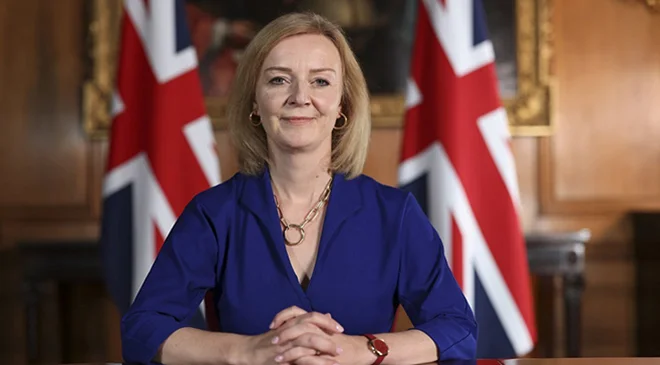Mary Elizabeth Truss, born 26 July 1975 is a British politician who is the leader of the Conservative Party.
She is currently serving as the Secretary of State for Foreign, Commonwealth, and Development Affairs since 2021 and Minister for Women and Equalities since 2019. A member of the Conservative Party, she has been a Member of Parliament (MP) for South West Norfolk since 2010.
She has served in various Cabinet positions under Prime Ministers David Cameron, Theresa May, and Boris Johnson.
Truss won the Conservative Party leadership election on 5 September 2022, beating her rival Rishi Sunak. She is due to be appointed Prime Minister on 6 September and will be the third woman to serve in that position.
Truss attended Merton College, Oxford, and was President of Oxford University Liberal Democrats. In 1996, she both graduated and joined the Conservative Party.
She worked at Shell and Cable & Wireless and was deputy director of the think tank Reform. Truss was elected for South West Norfolk at the 2010 general election. As a backbencher, she called for reform in several policy areas including childcare, mathematics education, and the economy.
She founded the Free Enterprise Group of Conservative MPs and wrote or co-wrote a number of papers and books, including After the Coalition (2011) and Britannia Unchained (2012).
Truss served as Parliamentary Under-Secretary of State for Childcare and Education from 2012 to 2014, before being appointed to the Cabinet by Cameron as Secretary of State for the Environment, Food, and Rural Affairs in the 2014 cabinet reshuffle.
Though she was a supporter of the Britain Stronger in Europe campaign for the UK to remain in the European Union in the 2016 referendum, she supported Brexit after the result. After Cameron resigned in July 2016, Truss was appointed Secretary of State for Justice and Lord Chancellor by May, becoming the first female Lord Chancellor in the thousand-year history of the office.
Following the 2017 general election, Truss was appointed Chief Secretary to the Treasury. After May resigned in 2019, Truss supported Johnson’s bid to become Conservative leader. He appointed Truss as Secretary of State for International Trade and President of the Board of Trade. She took on the additional role of Minister for Women and Equalities in September 2019.
She moved from the Department for International Trade to be promoted to Secretary of State for Foreign, Commonwealth and Development Affairs in the 2021 cabinet reshuffle. She was appointed the Government’s chief negotiator with the European Union and UK chair of the EU–UK Partnership Council in December 2021.
Mary Elizabeth Truss was born on 26 July 1975 in Oxford, England, to John Kenneth and Priscilla Mary Truss (née Grasby).
From an early age, she has been known by her middle name. Her father is an emeritus professor of pure mathematics at the University of Leeds, while her mother, the daughter of a Latin teacher at Bolton School, was a nurse, teacher and member of the Campaign for Nuclear Disarmament. Truss has described her parents as being “to the left of Labour”. When Truss later stood for election to Parliament as a Conservative, her mother agreed to campaign for her, while her father declined to do so.
The family moved to Paisley, Renfrewshire in Scotland when she was four years old, living there from 1979 to 1985, with Truss attending West Primary School. She then attended Roundhay School, in the Roundhay area of Leeds, a school which she later said had “let down” children. She then lived in Canada for a year. Truss has praised its coherent curriculum and the Canadian attitude that it was “really good to be top of the class”, in contrast to her education at Roundhay School. She read Philosophy, Politics and Economics at Merton College, Oxford, graduating in 1996.
Truss was active in the Liberal Democrats. She was president of Oxford University Liberal Democrats and a member of the national executive committee of Liberal Democrat Youth and Students (LDYS). During her time as a Liberal Democrat, Truss supported the legalization of cannabis and the abolition of the monarchy and campaigned against the Criminal Justice and Public Order Act 1994.
During a speech at the 1994 Liberal Democrat Conference, Truss stated: “I agree with Paddy Ashdown when he said, ‘Everybody in Britain should have the chance to be a somebody, but only one family can provide the head of state… we believe in referenda on major constitutional issues; we do not believe people should be born to rule, or that they should put up and shut up about decisions which affect their everyday lives”.
Truss joined the Conservative Party in 1996.
Truss served as the chair of the Lewisham Deptford Conservative Association from 1998 to 2000. Truss unsuccessfully contested the Greenwich London Borough Council elections in 1998 (for Vanbrugh ward) and 2002 (in Blackheath Westcombe).
On 4 May 2006, she was elected as a councilor for Eltham South in the Greenwich London Borough Council election. Truss did not seek re-election to the Council on 6 May 2010, with the 2010 general election being announced on 6 April 2010, the Dissolution of Parliament on 12 April 2010, and the last day to file MP nomination papers on 20 April 2010.
Wikipedia.com








